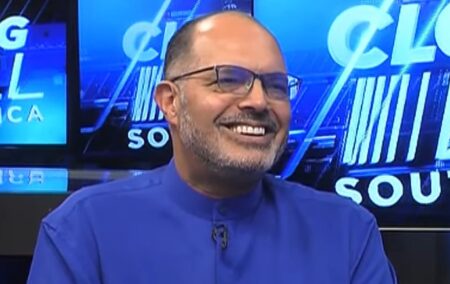South African Revenue Service Commissioner Edward Kieswetter has acknowledged that, in the face of ‘inefficiency, waste and corruption’, he understands that ‘many feel morally justified to fiddle with their taxes’.
But he said the ‘vulnerable and poorest’ in society suffered as a result.
Speaking at the virtual Tax Indaba on Monday – where he revealed that the revenue service was able to collect R460 billion compared to last year’s R519 billion in the same time – Kieswetter said: ‘I do understand the frustration many South Africans have when they witness inefficiency, waste and corruption in the country. I understand that many feel morally justified to fiddle with their taxes. But when we do, we hurt the vulnerable and poorest in society.’
His comments, reported by Business Insider, came as Stats SA’s latest figures showed South Africa’s GDP shrank in the second quarter this year by a mammoth 51%, mainly as a result of the Covid-19 lockdown.
All industrial sectors declined, with only agriculture, forestry and fishing showing positive growth.
Stats SA said: ‘The manufacturing industry contracted by 74,9% in the second quarter. All ten manufacturing divisions reported negative growth rates in the second quarter. The divisions that made the largest contributions to the decrease were basic iron and steel, non-ferrous metal products, metal products and machinery; food and beverages; and petroleum, chemical products, rubber and plastic products.’
Business Insider reported that the under-collection of tax revenue because of the sharp contraction of the economy in response to the stringent Covid-19 lockdown regulations may well be worse than the R300 billion touted in June. Tax collections were down 20% in August compared to the same time last year.
It said that Kieswetter noted that investigations into irregularities regarding the procurement of personal protective equipment (PPE) showed that 63% of the companies which were awarded tenders were found to be ‘tax uncompliant’, and 22 of the companies were linked to “politically exposed individuals”.
“The price we are paying as a society, in addition to the lost tax revenue, is the fact that many of these [illegal] operators have embedded themselves in the supply chain,” said Kieswetter.
Speaking at the same online indaba, executive chair of Business For SA, Martin Kingston, noted that there were limited sources of capital for infrastructure development, which included assets managed by pension funds.
But he warned against a regime of prescribed assets as a means for the government to gain access to savings which people had invested for their retirement.
‘To tamper with that is a flagrant breach, not only of the responsibilities of the trustees of the pension funds and the mandates of those funds, but it undermines the risk-adjusted returns offered to beneficiaries when they placed their savings with these institutions, regardless of their risk appetite,’ he said.
Business had been vocal in its disapproval of the use of funds managed by the Public Investment Corporation, especially in the context of the unsustainable Eskom debt of around R600 billion.
Prescribing assets and interfering with regulations would undermine South Africa’s credibility, the quality of its financial services sector, and trust and confidence in the country, he warned.

